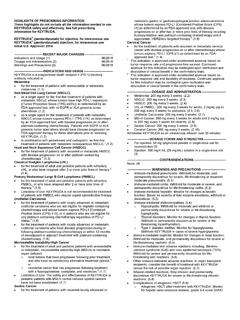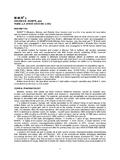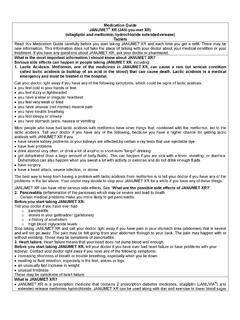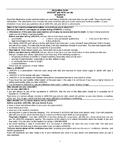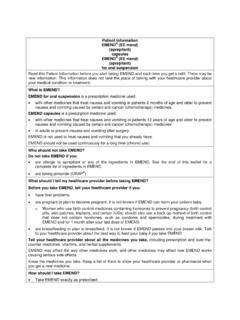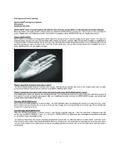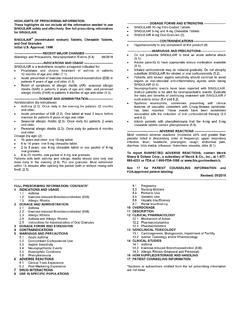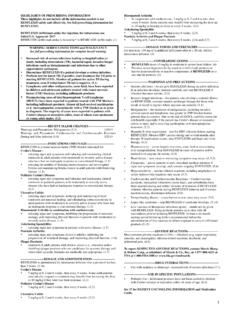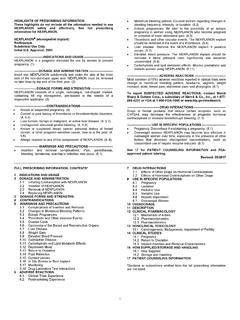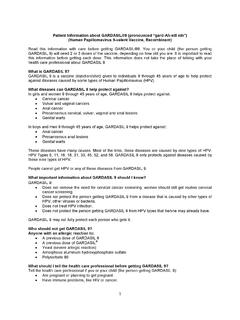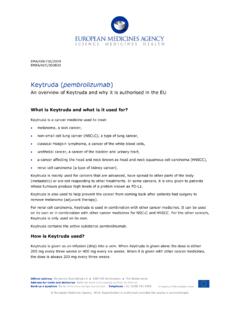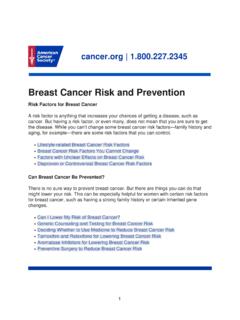Transcription of or - Merck | Home
1 MEDICATION GUIDE.. KEYTRUDA (key-true-duh) KEYTRUDA (key-true-duh). (pembrolizumab) (pembrolizumab). for injection injection What is the most important information I should know about KEYTRUDA? KEYTRUDA is a medicine that may treat certain cancers by working with your immune system. KEYTRUDA can cause your immune system to attack normal organs and tissues in any area of your body and can affect the way they work. These problems can sometimes become severe or life-threatening and can lead to death. These problems may happen anytime during treatment or even after your treatment has ended. Call or see your doctor right away if you develop any symptoms of the following problems or these symptoms get worse: Lung problems (pneumonitis).
2 Symptoms of pneumonitis may include: shortness of breath chest pain new or worse cough Intestinal problems (colitis) that can lead to tears or holes in your intestine. Signs and symptoms of colitis may include: diarrhea or more bowel movements than usual stools that are black, tarry, sticky, or have blood or mucus severe stomach-area (abdomen) pain or tenderness Liver problems, including hepatitis. Signs and symptoms of liver problems may include: yellowing of your skin or the whites of your eyes nausea or vomiting pain on the right side of your stomach area (abdomen). dark urine bleeding or bruising more easily than normal Hormone gland problems (especially the thyroid, pituitary, adrenal glands, and pancreas).
3 Signs and symptoms that your hormone glands are not working properly may include: rapid heart beat weight loss or weight gain increased sweating feeling more hungry or thirsty urinating more often than usual hair loss feeling cold constipation your voice gets deeper muscle aches dizziness or fainting headaches that will not go away or unusual headache Kidney problems, including nephritis and kidney failure. Signs of kidney problems may include: change in the amount or color of your urine Skin problems. Signs of skin problems may include: rash itching blisters, peeling or skin sores painful sores or ulcers in your mouth or in your nose, throat, or genital area Problems in other organs.
4 Signs and symptoms of these problems may include: changes in eyesight severe or persistent muscle or joint pains severe muscle weakness low red blood cells (anemia). swollen lymph nodes, rash or tender lumps on skin, cough, shortness of breath, vision changes, or eye pain (sarcoidosis). confusion, fever, muscle weakness, balance problems, nausea, vomiting, stiff neck, memory problems, or seizures (encephalitis). shortness of breath, irregular heartbeat, feeling tired, or chest pain (myocarditis). Infusion (IV) reactions that can sometimes be severe and life-threatening. Signs and symptoms of infusion reactions may include: chills or shaking shortness of breath or wheezing itching or rash flushing dizziness fever feeling like passing out Rejection of a transplanted organ.
5 People who have had an organ transplant may have an increased risk of organ transplant rejection. Your doctor should tell you what signs and symptoms you should report and monitor you, depending on the type of organ transplant that you have had. Complications, including graft-versus-host-disease (GVHD), in people who have received a bone marrow (stem cell) transplant that uses donor stem cells (allogeneic). These complications can be severe and can lead to death. These complications may happen if you underwent transplantation either before or after being treated with KEYTRUDA. Your doctor will monitor you for the following signs and symptoms: skin rash, liver inflammation, stomach-area (abdominal) pain, and diarrhea.
6 Getting medical treatment right away may help keep these problems from becoming more serious. Your doctor will check you for these problems during treatment with KEYTRUDA. Your doctor may treat you with corticosteroid or hormone replacement medicines. Your doctor may also need to delay or completely stop treatment with KEYTRUDA, if you have severe side effects. What is KEYTRUDA? KEYTRUDA is a prescription medicine used to treat: a kind of skin cancer called melanoma. KEYTRUDA may be used: o when your melanoma has spread or cannot be removed by surgery (advanced melanoma), or o to help prevent melanoma from coming back after it and lymph nodes that contain cancer have been removed by surgery.
7 A kind of lung cancer called non-small cell lung cancer (NSCLC). KEYTRUDA may be used with the chemotherapy medicines pemetrexed and a platinum as your first treatment when your lung cancer : o has spread (advanced NSCLC), and o is a type called nonsquamous , and o your tumor does not have an abnormal EGFR or ALK gene. KEYTRUDA may be used with the chemotherapy medicines carboplatin and either paclitaxel or paclitaxel protein- bound as your first treatment when your lung cancer : o has spread (advanced NSCLC), and o is a type called squamous . KEYTRUDA may be used alone as your first treatment when your lung cancer : o has not spread outside your chest (stage III) and you cannot have surgery or chemotherapy with radiation or o your NSCLC has spread to other areas of your body (advanced NSCLC), and o your tumor tests positive for PD-L1 , and o does not have an abnormal EGFR or ALK gene.
8 KEYTRUDA may also be used alone when: o you have received chemotherapy that contains platinum to treat your advanced NSCLC, and it did not work or it is no longer working, and o your tumor tests positive for PD-L1 , and o if your tumor has an abnormal EGFR or ALK gene, you have also received an EGFR or ALK inhibitor medicine and it did not work or is no longer working. a kind of lung cancer called small cell lung cancer (SCLC). KEYTRUDA may be used when your lung cancer : o has spread (advanced SCLC), and o you have received 2 or more types of chemotherapy, including one that contains platinum, and it did not work or is no longer working.
9 A kind of cancer called head and neck squamous cell cancer (HNSCC). KEYTRUDA may be used with the chemotherapy medicines fluorouracil and a platinum as your first treatment when your head and neck cancer has spread or returned and cannot be removed by surgery. KEYTRUDA may be used alone as your first treatment when your head and neck cancer : o has spread or returned and cannot be removed by surgery, and o your tumor tests positive for PD-L1 . KEYTRUDA may be used alone when your head and neck cancer : o has spread or returned, and o you have received chemotherapy that contains platinum and it did not work or is no longer working.
10 A kind of cancer called classical Hodgkin lymphoma (cHL) in adults and children when: o you have tried a treatment and it did not work or o your cHL has returned after you received 3 or more types of treatment. a kind of cancer called primary mediastinal B-cell lymphoma (PMBCL) in adults and children when: o you have tried a treatment and it did not work or o your PMBCL has returned after you received 2 or more types of treatment. a kind of bladder and urinary tract cancer called urothelial carcinoma. KEYTRUDA may be used when your bladder or urinary tract cancer : o has spread or cannot be removed by surgery (advanced urothelial cancer ) and, o you are not able to receive chemotherapy that contains a medicine called cisplatin, and your tumor tests positive for PD-L1 , or o you are not able to receive a medicine called cisplatin or carboplatin, or o you have received chemotherapy that contains platinum, and it did not work or is no longer working.
